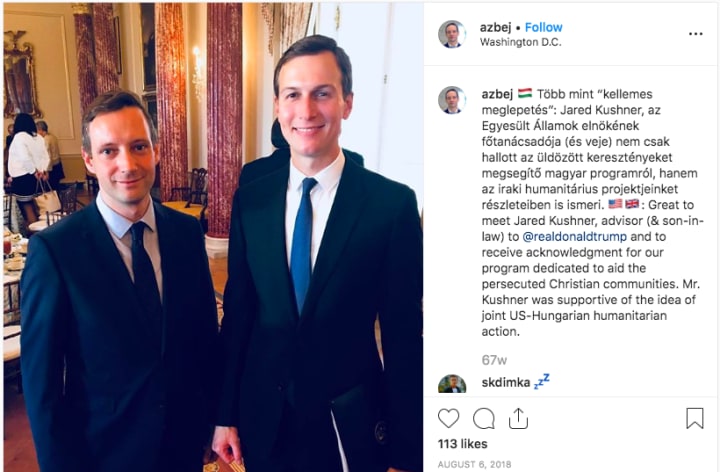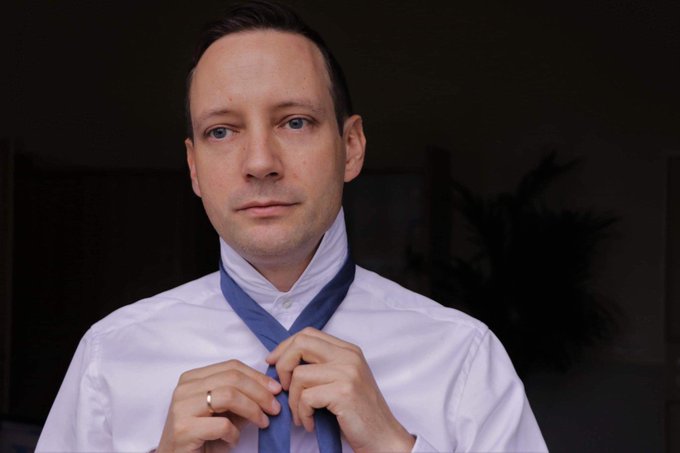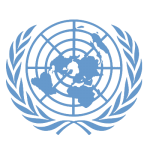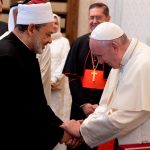Via Twitter.
By Michael Igoe – Devex
WASHINGTON — In mid-September 2018, a Hungarian official named Tristan Azbej traveled to Washington, D.C. for a series of meetings and events he hoped would draw the Hungarian and U.S. governments closer together in a mutual effort to help Christian minorities that had been targeted for genocide by the Islamic State in Iraq.
The visit came at an important time for both governments. On Sept. 12, 2018, the European Parliament voted to sanction Hungary for violating European Union rules on democracy, civil rights, and corruption. Meanwhile in Washington, D.C., the U.S. Agency for International Development was under intense pressure from Vice President Mike Pence to provide more support to Christian communities that were rapidly vanishing from the Middle East.
Pence’s frustration with USAID — for allowing what he considered unnecessary bureaucratic delays and overreliance on the United Nations to hinder direct support to Christian groups — had boiled over.
In June, Rep. Chris Smith and Robert McFarlane, Ronald Reagan’s national security adviser, published a column in the Wall Street Journal that admonished the Trump administration for failing to live up to its commitments to give more assistance directly to Christian groups in Iraq. The next day, under pressure from Pence and conservative lawmakers, USAID Administrator Mark Green removed a senior career official, Maria Longi, from the agency’s Middle East bureau and replaced her with a political appointee.
Unlike USAID, the Hungarian government seemed to be doing exactly what Pence and his political allies had in mind — and Christian advocates in the U.S. had begun to take note of Hungary’s approach.
“Many U.S. government officials have acknowledged the Hungarian program is a source of inspiration.”
— Tristan Azbej, Hungarian state secretary for the aid of persecuted Christians
In 2016, Prime Minister Viktor Orbán’s administration had created a special fund called “Hungary Helps,” which Azbej — Hungary’s state secretary for the aid of persecuted Christians — oversees. While many larger aid donors channel their funding through the U.N. or large international NGOs, Hungary Helps relies on relationships the Hungarian government has built with Christian leaders in Iraq to channel funding directly to local religious organizations and communities.
The Hungarian initiative would come to serve as a model for USAID’s new Genocide Recovery and Persecution Response initiative, which Pence announced at the first Ministerial to Advance Religious Freedom, hosted by the White House in July 2018.
“It would be very big headed from our part to say that it is mostly because of the Hungarian example being disseminated to the U.S., but many U.S. government officials have acknowledged the Hungarian program is a source of inspiration,” Azbej later told Devex.
The U.S. government has provided nearly $373 million through the GRPR initiative, $314 million of which has come from USAID. While USAID’s initial support largely focused on Christian groups, the agency also provides assistance to persecuted Yazidis in the region.
According to news reports, including a recent investigation by ProPublica, many USAID officials have expressed concern that Pence’s efforts might be forcing the agency to violate its own procurement guidelines, which prohibit political interference in award decisions, discrimination or favoritism based on religion, and which require that award decisions be based solely on merit. USAID denies that its awards to organizations assisting religious minorities have violated these guidelines. Officials have also expressed concern that favoring Christians might deepen, instead of healing, sectarian divides.
While Pence’s influence over USAID’s priorities, personnel, and funding policies has been well documented, there has been less attention to the unusual alliance between U.S. aid agencies and a growing coalition of conservative governments and advocates who view direct support to persecuted Christians as part of a global contest over culture, rights, and national borders.
As the Hungarian example gained greater recognition in the U.S., Azbej was also making a name for himself within conservative Christian circles.
During his 2018 visit, on Sept. 13, Azbej attended the Center for Security Policy’s annual Keeper of the Flame Award dinner, where he was honored with the conservative think tank’s first SaveUs Award, in recognition of “the exemplary leadership of the government of Hungary in helping those being brutally oppressed simply because they follow Jesus Christ.”
The Center for Security Policy is known for advancing anti-Islamic theories about Muslim influence in American cultural and political life. One of the center’s initiatives is the “Civilization Jihad Reader Series,” which portrays shadowy Islamic forces seeking to “erase America” by infiltrating Hollywood, the judiciary, and political parties.
In his acceptance speech, Azbej, introduced by Greg Mitchell, co-chairman of the influential International Religious Freedom Roundtable, said that this recognition of Hungary’s efforts came at a very important time, “where we need it, when we need it.” He described the European Union’s vote in favor of sanctioning Hungary, drawing boos from a largely sympathetic audience.
“They gave different explanations to why they sanctioned us, but we know the real reasons. The reason is that because of the Christan democratic government of Hungary and of Prime Minister Viktor Orbán, we are not subduing ourselves to the neoliberal agenda. We are not subduing ourselves to the tyranny of political correctness,” Azbej said, to rising applause.
“Instead we choose to defend our Judeo-Christian values. We choose to defend our national identity. And what hurts the most for the open border liberals of the European Union, we chose to defend our borders and close our gates to illegal migration,” he said, adding, “We closed our gates to radical Islam, and we defended all of Europe with that.”
This year’s award dinner took place on Saturday, and for the first time was held outside of New York or Washington, D.C. — at President Donald Trump’s Mar-a-Lago Club in Palm Beach, Florida, the Washington Post reported.
Telskuf, daughter of Hungary
The Trump administration has made international religious freedom a centerpiece of its foreign policy, with aid to persecuted religious minorities representing one of the most visible examples of that commitment.
Publicly, USAID officials explain the agency’s support for Christians and other religious minorities in the Middle East as part of an effort to maintain the region’s “ethnic and religious mosaic” and foster democratic pluralism — particularly in the absence of commitments by national governments to do the same.
As USAID has sought to satisfy the administration’s demands to send more funding directly to Christian groups, however, the agency has, at least in part, modeled its efforts on those of a government with very explicit political objectives and motivations for preserving Christian communities in the Middle East.

Hungary’s assistance to Christians in the Middle East is directly linked to the Orbán administration’s crusade to preserve Europe’s Christian cultural heritage, stop migration — particularly from Islamic countries — and reject what they see as a “politically correct” culture that refuses to discuss Christian persecution.
In the Middle East, Orbán sees a vision of a formerly Christian place now overtaken by Islam.
“However unbelievable it may seem today, the fate of Christians in the Middle East should bring home to Europe that what is happening over there may also happen to us,” Orbán said at a conference on Christian persecution in Budapest in Oct. 2017.
“For us, Europe is a Christian continent, and this is how we want to keep it. Even though we may not be able to keep all of it Christian, at least we can do so for the segment that God has entrusted to the Hungarian people. Taking this as our starting point, we have decided to do all we can to help our Christian brothers and sisters outside Europe who are forced to live under persecution,” he said.
Orbán described Hungary’s decision to forego the “framework of international aid,” and instead “channel resources directly to the churches of persecuted communities.” Hungary directs funding to Christian churches, “as we are Christians,” Orbán said, and he asserted that “trouble should not be brought here, but assistance must be taken to where it is needed.”
This week, on Tuesday, USAID Deputy Administrator Bonnie Glick will deliver remarks at the 2nd International Conference on Christian Persecution hosted by the Government of Hungary in Budapest.
Azbej told Devex he does not know exactly how U.S. officials first learned about Hungary’s efforts to support Christians in Iraq.
“It could have been providence, to be honest,” he said.
A USAID official told Devex that Hungary Helps attracted attention for what Azbej refers to as its flagship initiative — the rehabilitation of a town called Telskuf in Iraq’s Nineveh Plains, which had been home to Assyrian Christians before the Islamic State occupied it, forcing 1300 families to flee. The town was then mostly destroyed by coalition airstrikes.
In his 2018 award speech, Azbej said after an investment of $2.2 million from the Hungarian government, 1,000 of those families had returned. Now, he said, the town was known as “Telskuf, daughter of Hungary.”
“What we want is to have a town next to the daughter of Hungary that is called ‘the son of the United States’ — or ‘the sister of Germany,’ or even ‘the brother of the United Nations,” he said.
A complex relationship
Azbej closed his speech with an announcement. While Hungary was still reeling from the European Parliament’s rebuke, his meetings in Washington had gone well.
“Today I had very fruitful talks at the USAID. After exchanging mutual recognition, today we have decided to start joint actual projects on the ground in Iraq, and after that who knows, we will extend to all the other countries,” Azbej said, adding that Christians are persecuted in more than 80 countries.
The next day, Sept. 14, Azbej attended a State Department and USAID roundtable on international religious freedom. Hal Ferguson, senior deputy assistant administrator for USAID’s Middle East bureau — who replaced Longi after Green removed her — gave a presentation on the agency’s GRPR initiative. According to notes from the meeting reviewed by Devex, Ferguson said that USAID’s initiative was modeled on the Hungary Helps program.
Three months later, on Dec. 18, 2018, USAID and the government of Hungary formalized their partnership, signing a memorandum of understanding, “to increase cooperation through sharing knowledge, experience, and resources to develop projects in fields that include private-sector growth, housing, service-delivery, conflict-mitigation, religious freedom and other human rights.”
USAID has signed similar MOUs with the government of Poland and the Knights of Columbus.
USAID and Hungary Helps are now jointly supporting Yazidi communities, in addition to Christian communities — though Azbej estimates that roughly 90% of Hungary Helps’ funding has gone to Christians so far. In addition to Hungary Helps, the Hungarian government also contributes aid through other bilateral programs and the European Union.
Asked whether USAID saw any reason for concern about partnering with a government that has faced broad criticism for its migration policies and attacks on democratic institutions, a USAID official — who would only respond to questions on the condition of anonymity — told Devex the agency focuses on partnerships that can advance its development goals.
“We recognize that this is a complex relationship between the United States and Hungary, and we don’t see eye to eye on a lot of things. But at the end of the day, we recognize that there are certain development challenges in the world that need to be met not just by us, but by anybody who will help us,” the official said.
Asked whether signing an MOU with the Hungarian government to assist Christians in Iraq might be seen as an endorsement of the Orbán administration’s views on migration and maintaining Europe’s Christian culture, the official said USAID can only speak to the value of the work that Hungary and the U.S. government are pursuing together on the ground.
“In conversations that we’ve had with our Hungarian counterparts, it’s evident — and again, not speaking for Prime Minister Orbán, not speaking for the Hungarian government — but in the conversations we’ve had with our development counterparts in Hungary, it’s evident that their goal, that their objective is to try to help the persecuted religious minority communities in the Middle East,” the official said.
When Orbán visited the White House in May 2019, Trump complimented the Hungarian prime minister’s approach — both in assisting Christian communities and preventing migration.
“You have been great with respect to Christian communities. You have really put a block up, and we appreciate that very much,” Trump said.
Azbej has continued his effort to enlist more governments in the cause of supporting persecuted Christians in the Middle East.
During a meeting in Budapest on Oct. 30, Russian President Vladimir Putin and Orbán met with church representatives and expressed their mutual commitment to assisting Christian communities. Asked whether the U.S. government is concerned about how this coalition is evolving, the USAID official referred the question to the State Department.
________________________
Photo Credit: Photo by: Dogan Kokdemir / CC BY-NC-ND
https://www.devex.com/news/to-direct-more-funding-to-christians-usaid-looks-to-hungary-96055







